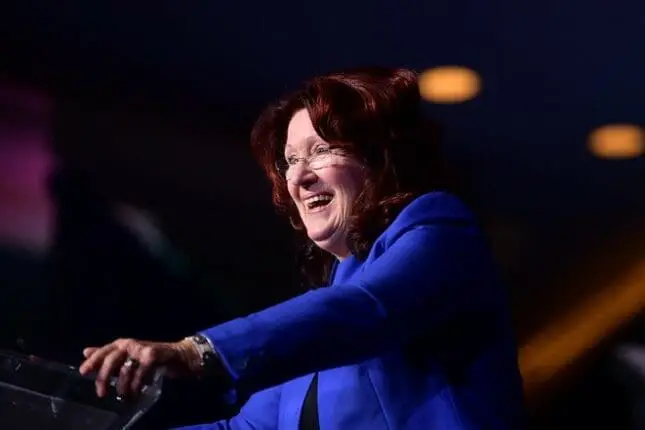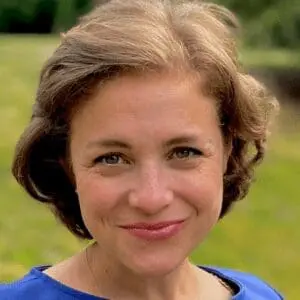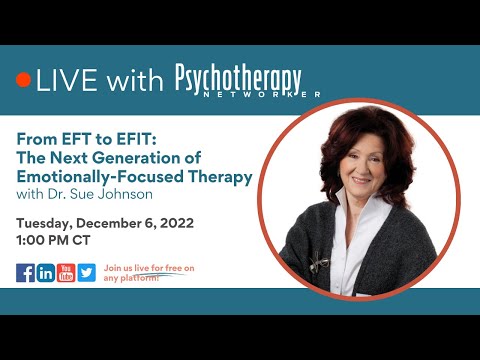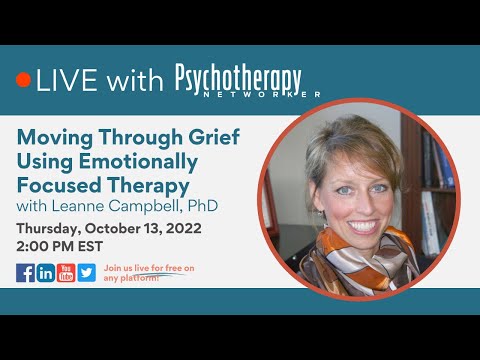As a therapist, one of my biggest fears is losing my passion for the work. What we do is hard; it takes mental and emotional energy that, as a mom to a rambunctious six-year-old, I sometimes don’t have. It also requires being a perpetual learner, keeping up with the newest developments in the field and staying curious about the human experience. It can be daunting to think about sustaining that level of drive for an entire career, especially when I’m feeling burned out.
So, when I found out that Sue Johnson, founder of one of the field’s most prominent and effective approaches to couples therapy, was now working on a treatment approach for individuals, I couldn’t help but wonder what was driving her. How, after decades of a successful career working with couples—when many folks would’ve hung up their hat and settled into retirement—has Sue found the motivation to develop a whole new treatment approach? Where does that energy, that passion come from? And how can I find it for myself?
I recently had the opportunity to talk with Sue about the launch of her newest course, a Master Class on Emotionally-Focused Individual Therapy (EFIT), and I couldn’t pass up the opportunity to get my questions answered.
Here’s what Sue had to say.
PN: Most of your career has been spent on couples, and here you are going in a brand-new direction with Emotionally-Focused Individual Therapy. What led to this shift?
Johnson: I think it came from the fact that we’d done so much work in couples. You know, we felt that we’d really achieved a lot. Over 20 outcome studies have shown that EFT works. We’ve taught it all over the world.
We know exactly what we have to do to create positive relationships and more secure attachment in partners. We know that these changes lead to less depression, less anxiety, less PTSD. And when we evaluate its effectiveness three years later, it had stuck. So then we thought, okay, so now what?
We’ve always worked with individuals and families, but over the last few years, it occurred to me and my colleagues that we’d been working more and more with traumatized individuals. So I began to think Why haven’t we ever really said that? Yes, we know how to work with individuals when their partner’s watching. We know how to take individuals into their emotions and move them toward a new emotional balance so they can dance with their partner differently. But let’s do for individual therapy what we did with couples. We started talking with colleagues and sharing ideas and looking at our tapes.
I started to realize that we had something significant to contribute to individual therapy—maybe as significant as what we’d contributed to couples therapy, because we have a basis in attachment science, which gives us a map to people’s inner life and their relational life. We also have all these studies on this very specific way of working where we know how to create key change events. In couples therapy, we think about improvement happening through key change events in the relationship, the relationship with other. But in EFIT we’re talking about creating a more secure connection with yourself before creating that secure connection with others.
I used to watch couples, and one of the things that fascinated me was you’d have the relationship shift and then the partners would start to grow each other. They’d become less depressed, but more than that, they’d become more assertive, more sure of themselves, more confident. You’d watch the partners help each other grow. I also thought that was the very best bit of couples therapy. And so I thought, okay, let’s focus on that bit without the other person in the room. So I started to get fascinated with change in individual therapy; How do people get stuck? How do they grow?
At the beginning of this year, Leanne Campbell and I came out with the primer in Emotionally-Focused Individual Therapy, and I’m delighted to say that I feel the same excitement and passion and curiosity as I did years ago. Watching our tapes and writing about EFIT as I did all those years ago when I watched couple sessions and thought, Oh my God, this stuff works! I’ve got to figure out exactly why and how it works and teach this to other people so they feel the same excitement!

As I listened to Sue reflect on her journey, I realized where she gets her energy and passion: she’s perpetually curious. That same curiosity drove her to search for the key to a healthy relationship, delving into the works of John Bowlby and Carl Rogers. It propelled her forward as she watched hundreds of hours of tape, put the pieces together in her mind, and created a new treatment modality. It inspired other therapists all over the world to join in her efforts to improve the way we help couples. And now, decades later, it’s inspired her to do it all over again, now for individuals.
Once again, it seems her passion and curiosity are contagious. Speaking about EFT therapists in a recent interview, Sue said, “They tend to be a passionate lot. They’ve joined together to create 92 learning communities all around the globe. They’re also a curious and committed bunch, always seeking to find the logic in people’s stuck strategies and patterns. Always finding ways to resonate with their clients and lead them into real growth and thriving. It is our birthright, our natural way of being.”
It makes me realize that we therapists are multidimensional. We’re seekers, always looking for the best ways to deal with our human frailties and fears. We’re scientists, carefully pinpointing negative patterns and discovering news ways to shift them. We’re shamans, who hold our clients and enchant them.
I imagine this is what Sue discovered on her own journeys. That these roles, these skills, lead to transformation, and beholding that transformation is exhilarating. When your work is exhilarating, as the therapist’s often is, the passion for it comes easy.
Enjoyed this feature? Watch Anna talk with Sue on their recent Networker Live event.
Anna Lock
Anna Lock, PsyD, is the clinical director at Psychotherapy Networker.














